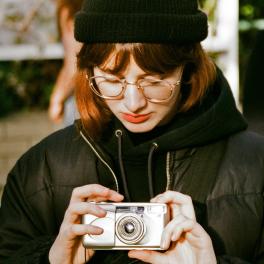
I was shocked to see a writer I admire post an Instagram story encouraging their followers to ‘see what AI can do for you’ in terms of heightening the creative process. The writer, who I will refer to as The Poet (because I do not feel that simply expressing an opinion warrants a 'call-out'), said that their thoughts had recently felt like a ‘wilted plant’, with AI providing a much-needed stake to prop up their blossoming ideas. This struck me as odd, but not for any reason I could pinpoint initially. After all, universities are now putting up countermeasures to students using ChatGPT to write their essays, beloved 80s pop icons Tears for Fears are using generative AI for their latest album cover, and AI chatbots are becoming more lifelike by the day. Surely anyone with an inquisitive mind and access to the Internet was experimenting with artificial intelligence.
Firstly, I need to make my stance on AI clear: I am firmly anti. I believe in utilising new technology, but absolutely not at the expense of the environment, nor to the detriment of the many artists and writers who have had their work plagiarised and commercially mutilated through AI training databases. The UN Environment Programme described in September 2024 the level of e-waste generated by the physical data centres housing AI, with a single request made through ChatGPT ‘consuming 10 times the electricity of a Google search’. This process produces waste containing mercury and lead, and requires excessive amounts of water to power functional cooling systems. Where the Poet and I are in the Global North, it is easy to meet our more trivial needs with AI (a 1000-word essay, an album cover, bullying a Peter Griffin chatbot for TikTok views) but in doing so, we centre ourselves in the wider debate over who climate disasters will affect the most and who these consequences will reach the fastest. I think it goes without saying that it will not be us.
After some thought, I realised what surprised me about The Poet promoting AI was that in having read their books and poetry for the better part of a decade, I felt as though some strange parasocial bond had been severed. Considering the intimacy of their style and ideas, which frequently traversed human connection and our relationship with the natural world, it seemed deeply unnatural to me that they should now be imploring their community to use something so harmful to the environment as AI. Therein, I think, lies part of the issue: having 24/7 access to our role models’ immediate thoughts and feelings dissolves any sense of boundary between us and them. We aren’t friends, I thought, we are strangers. So why did it feel like such a betrayal? For the simple reason that our views on a single issue did not align?
The subsequent brief, but nonetheless unpleasant, exchange could have been avoided entirely if I had just kept quiet. However, I was stirred to say something. To not necessarily criticise, but to question. It seemed unlikely that my mind would be changed, nor did I really want it to (more on that later), but The Poet was someone whose intelligence and eloquence I respected so much, that I decided I needed to know more about how they felt. I made a comment on their recent Instagram post as there was no other way to reach them. The images were unrelated, but I justified it to myself by noting that it had been posted at the same time as the story and besides, the comments were filled with The Poet’s followers, praising the former’s use of AI and sharing similar accounts of their own. I must have realised on some level that anything resembling critique on a personal post would not go down well, but I was under the impression that my comment was fairly innocuous: "Curious to know what your opinion on the environmental impact of AI is !". Not hugely expecting a reply and intending it as more of a nudge for later elaboration, I carried on with my evening. However, only around fifteen minutes later:
"Eventually I will get round to it but not in the comment section of my contemplative graveyard post’"
I felt embarrassed, for sure. I had been scolded for my choice of where to comment; I had crossed a boundary between creator and consumer. At first, I scrambled to put together a reply, a desperate apology to assure The Poet I had not meant to cross a line and was just interested in hearing more. After realising whatever I wrote sounded whiny and pathetic, I deleted my comment altogether, an action I soon regretted after seeing their latest story, posted minutes after our interaction:
‘"Realizing i simply don’t like to persuade,,i like playing idea hot potato with people who already agree with me,,"
The embarrassment boiled over. The idea that I had asked or ever invited persuasion infuriated me. My comment had been singled out as the only one not explicitly praising them, and not only had I been called out for it but had become the subject of, well, a childish ‘shady’ Instagram story. There was nowhere to reply or to defend myself, but I knew in doing so I would only make myself seem rabidly obsessed. Maybe I was. I might still be in a way, hence why this article exists. Once the anger had simmered, I considered why it burned so much to begin with. For one, The Poet had made a bold, pro-AI statement publicly to a large following of creatives, but had reacted to me prompting any further discussion with hostility. They had then admitted they only wanted to hear from people who ‘already agreed’ - effectively barring a good deal of voices from the conversation they had sparked.
I absolutely could have gone about it in a more sensible way. That being said, I am ashamed of myself for deleting my comment. To stand down at the first spark of disagreement makes me feel spineless, especially on a topic I feel so passionate about. However, in a strange way, I respect The Poet for being so honest about their dislike for leaving their echo chamber. If anything, I think what we have garnered from our exchange is that we will both shrink further into our respective echo chambers, at least until it gets too boring and we decide to venture out for a brief chat with the neighbours. My willingness to hear from a pro-AI perspective has drained steadily since then, but I don’t believe this has been all bad. If anything, The Poet has strengthened my resolve to speak up, and for that I thank them.
Support Young Creators Like This One!
VoiceBox is a platform built to help young creators thrive. We believe that sharing thoughtful, high-quality content deserves pay even if your audience isn’t 100,000 strong.
But here's the thing: while you enjoy free content, our young contributors from all over the world are fairly compensated for their work. To keep this up, we need your help.
Will you join our community of supporters?
Your donation, no matter the size, makes a real difference. It allows us to:
- Compensate young creators for their work
- Maintain a safe, ad-free environment
- Continue providing high-quality, free content, including research reports and insights into youth issues
- Highlight youth voices and unique perspectives from cultures around the world
Your generosity fuels our mission! By supporting VoiceBox, you are directly supporting young people and showing that you value what they have to say.





